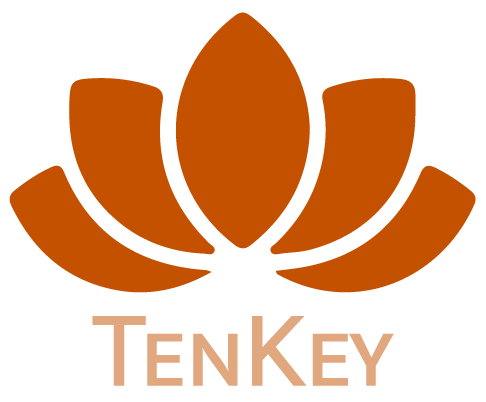Is bookkeeping a headache? Yes, it can be. But it’s made much more difficult if you don’t have a basic understanding of what to do and why. With this guide, you can keep your own records and avoid the hassle of incorrectly kept books.
Of course, we here at TenKey are always happy to help with all of your bookkeeping needs, so should you ever need help with your books or perhaps CFO Services, we have you covered! Just give us a call at 971-220-6416, and we will have you sorted out in no time.
Where to Start
Record keeping is the best place to begin when trying to get an idea of where you stand with your books. Here are the three most popular options:
Accounting Book: Manually keeping track of your books in a physical accounting records book is a tried and true method for bookkeeping. This can be very cumbersome, especially when / if you are audited or need to recall something quickly.
Spreadsheets: This method gets you into a digital format that can be a little easier to search quickly. Human error can easily creep into your spreadsheets and wreak havoc down the road.
Bookkeeping Software: While the most expensive option, bookkeeping software can offer a lot of features that make aspects of keeping records clean and easy for you to understand. This is the best option for proper record keeping. Look for a software suite that makes sense for your needs and the size of your business.
Accountant vs. Bookkeeper vs. DIY
You don’t need a degree to do your own books, but it can help! Here are the differences between your bookkeeping options.
DIY: If you have the time and a bookkeeping app, you can keep your own records pretty easily. Making mistakes can cost you big down the road, but the more you do it yourself, the easier it will become. This is also advantageous because you will always have a good idea of how things are going, and you won’t be paying someone else to keep your books.
Accountant: Accountants are usually responsible for general oversight of accounts and producing tax documents and financial statements that comply with local and federal laws.
Bookkeeper: A bookkeeper will dig into the nitty-gritty of everyday financials for your company to keep a lasting and accurate record of all your finances. They do this monthly, quarterly, or yearly, based on your needs.
Basic Bookkeeping Types You Should Know
You are going to need to understand some basics about bookkeeping to make things much easier in the long run for you. Here is a list of bookkeeping types you should understand:
Sales: The account where all your incoming revenue from sales transactions. This is one of the most important accounts you have and should be kept up to date.
Cash: The account where all business transactions pass. Another very important account, bookkeepers usually will use two journals, cash disbursements and cash receipts, to track activity.
Accounts Receivable: If you sell services that are billed for over time, you need accounts receivable account that tracks the money due from customers.
Loans Payable: This account tracks what you owe, to whom, and from when.
Inventory: This is the account where you keep track of the type and quantity of products you keep in stock. Physical counts should be done regularly to ensure the books track with reality.
Purchases: This is the account where you track what you’ve bought for your business.
Payroll Expenses: The account where you track the wages and salaries paid to your employees. This is usually the highest cost for any company with employees.
Important Bookkeeping Practices You Should Probably Do
Yes, it seems overwhelming at first, but keeping the books for your own company is doable if you break it down into steps and habits that you follow religiously.
Avoid Procrastination: If you are pressured into doing things at the last minute, something will slip by. If everything is always up to date, you won’t ever be left in the lurch looking for crucial info.
Keep Your Books Tidy: Yes, your books can easily fall into a clustered mess, and yes, that makes things harder on you in the long run. Keep it clean, and you won’t regret it.
Store Your Receipts: If you store your receipts digitally and keep them on a routine backup schedule, you never have to worry about whether you are compliant or not.
Keep Business and Personal Books Separate: This is easier said than done, and what a hassle it will save you!
Basic Bookkeeping Terms You Should Know
If you don’t know the difference between a balance sheet and an income statement, you will have a hard time keeping your books well. Here is a shortlist of the top bookkeeping terms that you should understand.
Trial Balance: A business document where all ledgers are compiled into debit and credit columns. This is a check sheet that ensures the books are mathmathically correct.
Profit and Loss: A report that shows the financial revenue and expenses for a specified time.
Expense: This is a fixed, Variable, day-to-day, or accrued cost that your business incurs via operations.
Balance Sheet: A report that shows your business's financial situation.
Chart of Accounts: The full list of accounts used in your business to track and categorize financial transactions.
You Don’t Have to do it Alone
Of course, if you insist on keeping your books yourself, you can! But you don’t have to go it alone, whether you need a little help with a few of your accounts, or if you want a one stop shop to keep your business squared away 24/7, TenKey can help.
Just give us a call at 971-220-6416, or shoot us an email at HELLO@TENKEYLLC.COM, and let us know what you need help with. We have over 20 years of experience in keeping books, and are proud to serve the community!


